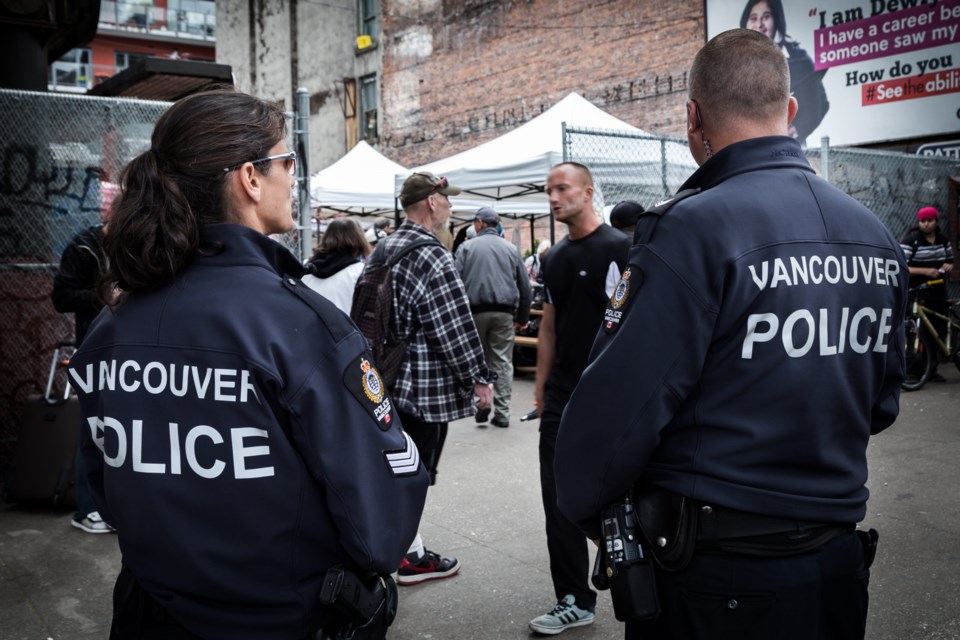BC has taken the major step of applying to Ottawa to decriminalize possession of small amounts of illicit drugs, in an attempt to curb the worsening overdose crisis. But despite months of negotiations with various frontline user groups, and police, almost nobody appears happy with the province’s final plan.
Addictions Minister Sheila Malcolmson unveiled the application Monday, flanked by Provincial Health Officer Dr. Bonnie Henry and Chief Coroner Lisa Lapointe. The trio eloquently and convincingly described the government's overall goal, to remove a person’s fear of being arrested and given a criminal record for being caught with a small amount of illegal drugs, thereby reducing the stigma in coming forward to seek help, safe services and treatment.
“Substance use and addiction is a public health issue, not a criminal one,” said Malcolmson.
“Criminalizing people using drugs has meant punishing those that are already suffering,” added Lapointe.
Virtually everyone, from police to user groups, agrees with the goal.
It’s just not clear whether BC’s actual plan will get us there.
The province’s proposal, if approved by Ottawa, would mean people carrying under 4.5 grams of certain drugs (opioids, cocaine and methamphetamines) would not face criminal charges, fines, or have their drugs seized by police.
Ten organizations, including the BC Centre on Substance Use, Pivot Legal Society and Vancouver Area Network Drug Users, were immediate in arguing the 4.5 gram level was too low.
They participated in a planning table with the province for months, but saw the amount changed by government 24 hours before the press conference to make it a “cumulative” total of all drugs a person is carrying, rather than the maximum for each type of substance
“We know this stuff. We know how much dope people use and possess,” said Garth Mullins, of VANDU.
“But when governments change the fine print and insist on lower possession thresholds, half of us get left behind. In BC, that means half of the 100,000 with ‘Opioid Use Disorder’ will still be criminalized, harassed, cuffed and jailed.”
On the other side of the argument was the BC Association of Chiefs of Police, which argued the 4.5 gram level was too high and would result in an “increase in public consumption” and that “predatory drug traffickers will exploit this high threshold” among other things.
“The BCACP recommends a more measured approach that will see incremental increases as required, and supported by evidence,” it said in a statement.
Malcolmson and Henry admitted the amount set is contentious but it’s a starting point that will be reviewed annually if approved.
BC also suggested in its application it might expand the list of drugs covered by decriminalization to include MDMA (ecstasy) and psilocybin (mushrooms) in the future - another area frontline organizations accused the province of falling short on.
The province mused about one day expanding the decriminalization exemption from adults 19+ to children as low as 12, but that youth criminal justice reforms would need participation from Ottawa.
“The BC model does not include protections for youth - those under 19,” said Leslie McBain.
“Instead, it threatens to throw youth into the criminal justice system for possessing any amount of illicit substance, despite what we know about the harms of drug prohibition and criminalization for young people. This is not what we families want for our kids.”
BC is seeing a rising number of youth overdoses, in which family members have been unable to get help due to long wait times or gaps in the system.
Premier John Horgan proposed, then withdrew, a bill last year that would have forced children into substance use treatment after an overdose, amid complaints from a wide number of groups it would only increase stigma and make matters worse. Horgan has pledged the bill will return after more consultation.
Frontline groups also expressed concern that police were even included in drafting the application at all, arguing marginalized drug users have long experience being oppressed and detained by police. Dr. Henry countered that police coming forward and supporting drug decriminalization has made them a powerful ally for reform.
The application says police will be forbidden from seizing drugs from users, because a person in the throws of addiction could then be forced into even more risky behaviour, like property crime and sex work, to try and gather back the drugs they’re forced to use as part of their health condition.
With BC’s application sent, all eyes now turn to Ottawa.
The City of Vancouver applied for an exemption to the federal government last year, but is still waiting for a response. Toronto is also preparing its own application.
Prime Minister Justin Trudeau has not endorsed the idea of widespread decriminalization, but has said he’s willing to work with BC on its request and other solutions to the overdose crisis.
Rob Shaw has spent more than 13 years covering BC politics, now reporting for CHEK News and writing for The Orca. He is the co-author of the national best-selling book A Matter of Confidence, and a regular guest on CBC Radio.
SWIM ON:
- Rob Shaw: The provincial government’s bill amounts to tinkering around the edges of a worsening housing crisis.
- Like it or not, microdosed mail-order mushrooms are here – it’s time for a real conversation about drugs, says Ada Slivinski.
- The answer to addiction will not be found in the industries of incarceration and prescription, says former police officer Anil Anand.



